by Jodie T. Allen
When Muslim youth rioted in the suburbs of France late last year, commentators were quick to fault the French “color-blind” assimilation model. “The unrest in France’s cities shows that social and policing policy has failed, as well as integration,” read the headline on an article in the Economist magazine on November 12, 2005.
But findings from the latest Pew Global Attitudes Survey, which included over-samples of Muslims in four European countries,1 suggest that the French model can claim some success, however mixed. Some aspects of that relative success are especially striking when compared with the attitudes and experiences of Muslims in Great Britain, where police last week foiled a home-grown plot by Islamic terrorists to blow up U.S.-bound airliners.
France is home to the largest Muslim population in Europe, an estimated 5 million persons primarily of Algerian and Moroccan extraction (since religion is not tabulated in France’s census, no official estimate is available). Similarly, Muslims in Spain are largely of Moroccan extraction. By contrast, Pakistanis predominate among Britain’s Muslims along with other ethnicities, while Germany’s Muslims are primarily Turkish in origin.
Where European Muslims Mostly Agree
When you see your Muslim friends on a daily basis you don’t think that relations with Muslims are bad. But if all you do is watch television, most of what you see are extreme examples of Islam. Islam is not the religion of terror. But people are afraid of terrorism and too often religion is mixed up in the debate.
– Pierre-Etienne Issoulie, 22, architect, Paris2
It’s true that relations are bad, but to go from there to saying who’s wrong? I think everyone bears some responsibility. On the Muslim side, it’s too much religion, religion, religion, and they don’t want to open up to others.
– Jeannine Pilé, 33, housewife and mother
[All interviews cited in this analysis were conducted in France by reporters for the International Herald Tribune.]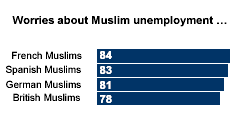 French Muslims do share many opinions with their co-religionists in neighboring countries. Primary among them is concern about joblessness. More than half of French Muslims (52%) say they are very worried about unemployment among Muslims — the primary complaint of last fall’s rioters — and an additional 32% say they are somewhat concerned. These levels are comparable to those expressed by Spanish, German and, to a slightly lesser degree, by British Muslims. (Curiously, among French Muslims, only 48% of those under age 35 say they are very worried about unemployment compared with 59% of their elders.)
French Muslims do share many opinions with their co-religionists in neighboring countries. Primary among them is concern about joblessness. More than half of French Muslims (52%) say they are very worried about unemployment among Muslims — the primary complaint of last fall’s rioters — and an additional 32% say they are somewhat concerned. These levels are comparable to those expressed by Spanish, German and, to a slightly lesser degree, by British Muslims. (Curiously, among French Muslims, only 48% of those under age 35 say they are very worried about unemployment compared with 59% of their elders.)
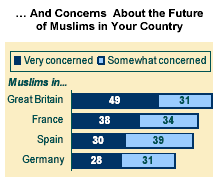 Like Muslims elsewhere in Europe, the French also worry more generally about the future of Muslims in their country — though, in this case, Muslims in France are significantly less worried than those in Great Britain. A majority (57%) is also at least somewhat concerned about the declining importance of religion among their co-religionists in France, though again, British Muslims are more troubled on this score with 73% sharing the worry. (In this, as in other questions in the survey, no significant difference is seen among the responses of French Muslims of Algerian, Moroccan or other ethnicity.)
Like Muslims elsewhere in Europe, the French also worry more generally about the future of Muslims in their country — though, in this case, Muslims in France are significantly less worried than those in Great Britain. A majority (57%) is also at least somewhat concerned about the declining importance of religion among their co-religionists in France, though again, British Muslims are more troubled on this score with 73% sharing the worry. (In this, as in other questions in the survey, no significant difference is seen among the responses of French Muslims of Algerian, Moroccan or other ethnicity.)
Not surprisingly, a majority of French Muslims (63%) sympathize with their youthful rioters — but not much more so than do Muslims in Spain and Germany. Interestingly, British Muslims are significantly more tolerant of the French car-burners, with fully 75% offering their sympathy.
Common Attitudes toward Non-Muslims
Relations between Muslims and westerners may be bad between governments; I don’t actually think they are bad between people. But the people don’t really get a chance to get to know each other… I think the mass media has played a big role in this. It’s not objective on either side, and that leads to false stereotypes.
– M’hand Chabbi, 29, of Moroccan origin, works selling Moroccan specialties in a central Paris market
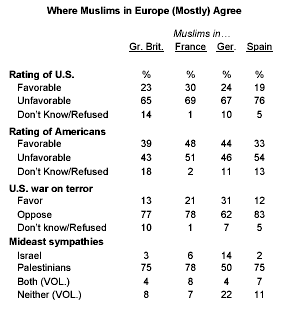 French Muslims share the view that relations between Muslims and Westerners are bad, a view prevalent elsewhere in Europe — and in predominantly Muslim countries — with the exception of Spain, where nearly half of the Muslim population rates relations as good compared with fewer than a quarter who call them bad. But while 58% of French Muslims view relations with Westerners as bad, far more (41%) view these relations as good than do British or German Muslims.
French Muslims share the view that relations between Muslims and Westerners are bad, a view prevalent elsewhere in Europe — and in predominantly Muslim countries — with the exception of Spain, where nearly half of the Muslim population rates relations as good compared with fewer than a quarter who call them bad. But while 58% of French Muslims view relations with Westerners as bad, far more (41%) view these relations as good than do British or German Muslims.
Additional points of similarity between French and other European Muslims include generally unfavorable opinions of the United States, of its war on terrorism and, to a lesser degree, of its citizens
Also, like the great majority of Muslims in Great Britain and Spain (though less so in Germany) French Muslim sympathies in the Middle East lie with the Palestinians rather than with Israel. However, nearly two-in-three French Muslims (65%) worry about extremism among Muslims — as do even more (70%) of British Muslims. And, like Muslims elsewhere in Europe only a tiny minority of French Muslims (16%) say that suicide bombings and other violence against civilian targets in defense of Islam can often or sometimes be justified.
Voici La Différence
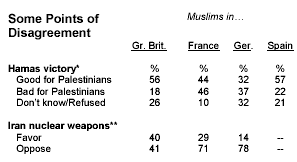 However, even on the hot button issues of the Middle East, French Muslims depart company with others of their faith both in Europe and in the Muslim world. For example, French Muslims are evenly split on the question of the effect of the victory by the radical group Hamas in this year’s Palestinian election, with 44% saying it was good for Palestinians and 46% judging it bad. By comparison, British Muslims weighed in lopsidedly on the positive side (56% ‘good’ vs. 18% ‘bad’) as did Spanish Muslims (57% vs. 22%).
However, even on the hot button issues of the Middle East, French Muslims depart company with others of their faith both in Europe and in the Muslim world. For example, French Muslims are evenly split on the question of the effect of the victory by the radical group Hamas in this year’s Palestinian election, with 44% saying it was good for Palestinians and 46% judging it bad. By comparison, British Muslims weighed in lopsidedly on the positive side (56% ‘good’ vs. 18% ‘bad’) as did Spanish Muslims (57% vs. 22%).
Moreover, joined only by German Muslims in Europe, the French are heavily opposed (71%) to the acquisition of nuclear weapons by Iran. British Muslims, in contrast, are evenly split on the subject.
And while the majority of Muslims in all four European countries surveyed say they have little or no confidence in Osama bin Laden, French Muslims are virtually unanimous (93%) in their disdain. (By comparison, 68% of British Muslims submit a vote of no confidence in the Al Qaeda leader.)
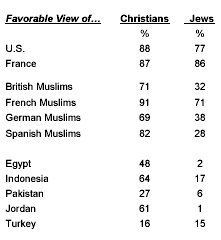 Most striking, however, is the difference between the views that French Muslims hold about people of other faiths and the views held by Muslims elsewhere in Europe and in predominantly Muslim countries. French Muslims even top the general publics in the United States and France in favorable ratings of Christians (91% of French Muslims vs. 88% of Americans and 87% of the French take that view).
Most striking, however, is the difference between the views that French Muslims hold about people of other faiths and the views held by Muslims elsewhere in Europe and in predominantly Muslim countries. French Muslims even top the general publics in the United States and France in favorable ratings of Christians (91% of French Muslims vs. 88% of Americans and 87% of the French take that view).
But what most distinguishes French Muslims from their co-religionists not only in the Muslim world but in Europe, is their attitude toward Jews. Fully 71% of French Muslims express a positive view of people of the Jewish faith, compared with only 38% of German Muslims, 32% of British Muslims, 28% of Spanish Muslims and still lower numbers in the predominantly Muslim countries surveyed. In this, Muslims reflect the view of the larger French public among whom fully 86% express a favorable opinion of Jews, a higher proportion than even than among the American public.
At Home in France?
There are a lot of Muslims who are much more open, who don’t pray regularly — that’s what I see in France. What happens in other countries I don’t know. From what I see it’s half and half in France. There are some who are super-cool, who are not practicing, who are very open to France, and others who are less.
– Wahid Chekhar, 34, actor
Most Muslims in France feel very French — but they feel that the French don’t see them that way, because they may look Arab or black…. Surveys suggest that Muslims are generally more conservative for example on issues such as sexuality and marriage… [But] the fraction of Muslims actively practicing their religion in France is only 10 percent, which is very similar to that of practicing Catholics.
– Catherine Wihtol de Wenden, immigration specialist and research director, Center for International Studies and Research, Paris
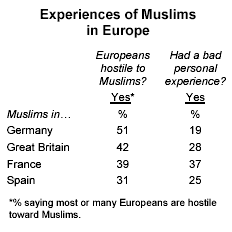 By and large, Muslims in France do not seem to see themselves as surrounded by hostile natives. Just 39% say they think many or most Europeans are hostile toward Muslims — considerably lower percentage than the 56% among the general French population who take that view. In Germany, where most Muslims are of Turkish descent, roughly half (51%) see Europeans as unwelcoming — a view shared by 63% of the larger German public.
By and large, Muslims in France do not seem to see themselves as surrounded by hostile natives. Just 39% say they think many or most Europeans are hostile toward Muslims — considerably lower percentage than the 56% among the general French population who take that view. In Germany, where most Muslims are of Turkish descent, roughly half (51%) see Europeans as unwelcoming — a view shared by 63% of the larger German public.
This perception of welcome persists despite the fact that French Muslims are somewhat more likely than those in other European countries to report that they have had a bad experience attributable to their race, ethnicity or religion. Nearly four-in-ten Muslims (37%) in France report such incidents, compared with 28% in Britain, 25% in Spain and 19% in Germany. Younger French Muslims are more likely to report a bad experience — 40% of those under age 35 compared with 31% of those age 35 or older.
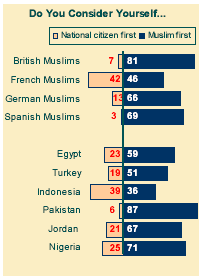 But what most distinguishes French Muslims among others in Europe are their self-perceptions. Few Muslims living in France see a natural conflict between being a devout Muslim and living in a modern society. Seven-in-ten French Muslims (72%) perceive no such conflict, a view shared by a virtually identical 74%-share of the French general public. In Great Britain, however, Muslims split evenly (47% see a conflict, 49% do not) while only 35% of the British general public see no inherent conflict between devotion to Islam and adaptation to a modern society.
But what most distinguishes French Muslims among others in Europe are their self-perceptions. Few Muslims living in France see a natural conflict between being a devout Muslim and living in a modern society. Seven-in-ten French Muslims (72%) perceive no such conflict, a view shared by a virtually identical 74%-share of the French general public. In Great Britain, however, Muslims split evenly (47% see a conflict, 49% do not) while only 35% of the British general public see no inherent conflict between devotion to Islam and adaptation to a modern society.
Moreover, when asked whether they consider themselves as a national citizen first or as a Muslim first, French Muslims split relatively evenly (42% vs. 46%) on the issue. Not only is this remarkably different from Muslims elsewhere in Europe (fully 81% of British Muslims self-identify with their religion rather than their nationality, for example) but it is remarkably close to the responses given by Americans when asked whether they identify first as national citizens or as Christians (48% vs. 42%). Perhaps in this, as in other things, Muslims living in France are indeed absorbing the secular ways of their countrymen, among whom fully 83% self-identify with their nationality, rather than their religion.
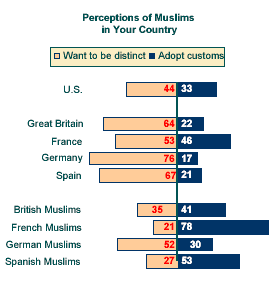 On this one question, however, some evidence of a growing Islamic identity among younger French Muslims appears. Among those under age 35, many of them French by birth, only 40% self-identify primarily as French while 51% self-identify first as Muslim, while 7% say both equally. Among those 35 and older, 45% self-identify with their nationality, 36% as Muslims and 16% as both equally.
On this one question, however, some evidence of a growing Islamic identity among younger French Muslims appears. Among those under age 35, many of them French by birth, only 40% self-identify primarily as French while 51% self-identify first as Muslim, while 7% say both equally. Among those 35 and older, 45% self-identify with their nationality, 36% as Muslims and 16% as both equally.
However, no such age differential appears on the question of whether Muslims in France want either to be distinct from the larger culture or to adopt its customs. Nearly eight-in-ten French Muslims (78%) say they want to adopt French customs. Those under age 35 are equally as likely to say this as are their elders. This high preference for assimilation compares with that expressed by 53% of Muslims in Spain, 41% in Britain and 30% in Germany.
All in all, one might conclude that, despite their problems — prime among them joblessness among youth generally, not just Muslim youth — the French need take no integrationist lessons from their European neighbors.
Notes
1Special samples among Muslim populations were surveyed in France, Germany, Great Britain and Spain in the Spring of 2006. For the complete report, including a summary of the methodology. economic and demographic data on the countries surveyed, and complete topline results see The Great Divide: How Westerners and Muslims View Each Other
2All interviews cited in this analysis were conducted in France by reporters for the International Herald Tribune.


